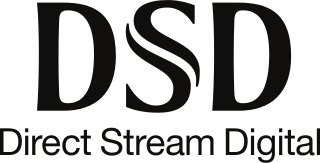Related Research Articles

Vorbis is a free and open-source software project headed by the Xiph.Org Foundation. The project produces an audio coding format and software reference encoder/decoder (codec) for lossy audio compression. Vorbis is most commonly used in conjunction with the Ogg container format and it is therefore often referred to as Ogg Vorbis.
An audio codec is a device or computer program capable of encoding or decoding a digital data stream that encodes or decodes audio. In software, an audio codec is a computer program implementing an algorithm that compresses and decompresses digital audio data according to a given audio file or streaming media audio coding format. The objective of the algorithm is to represent the high-fidelity audio signal with a minimum number of bits while retaining quality. This can effectively reduce the storage space and the bandwidth required for transmission of the stored audio file. Most software codecs are implemented as libraries which interface to one or more multimedia players. Most modern audio compression algorithms are based on modified discrete cosine transform (MDCT) coding and linear predictive coding (LPC).
RealAudio, or also spelled as Real Audio is a proprietary audio format developed by RealNetworks and first released in April 1995. It uses a variety of audio codecs, ranging from low-bitrate formats that can be used over dialup modems, to high-fidelity formats for music. It can also be used as a streaming audio format, that is played at the same time as it is downloaded. In the past, many internet radio stations used RealAudio to stream their programming over the internet in real time. In recent years, however, the format has become less common and has given way to more popular audio formats. RealAudio was heavily used by the BBC websites until 2009, though it was discontinued due to its declining use. BBC World Service, the last of the BBC websites to use RealAudio, discontinued its use in March 2011.
Shorten (SHN) is a file format used for compressing audio data. It is a form of data compression of files and is used to losslessly compress CD-quality audio files. Shorten is no longer developed and other lossless audio codecs such as FLAC, Monkey's Audio (APE), TTA, and WavPack (WV) have become more popular. It is still in use to trade concert recordings that are already encoded as Shorten files. Shorten files use the .shn file extension.

FLAC is an audio coding format for lossless compression of digital audio, developed by the Xiph.Org Foundation, and is also the name of the free software project producing the FLAC tools, the reference software package that includes a codec implementation. Digital audio compressed by FLAC's algorithm can typically be reduced to between 50 and 70 percent of its original size and decompresses to an identical copy of the original audio data.

DVD-Audio is a digital format for delivering high-fidelity audio content on a DVD. DVD-Audio uses most of the storage on the disc for high-quality audio and is not intended to be a video delivery format.

Direct Stream Digital (DSD) is a trademark used by Sony and Philips for their system for digitally encoding audio signals for the Super Audio CD (SACD).
The digital sound revolution refers to the widespread adoption of digital audio technology in the computer industry beginning in the 1980s.
The Apple Lossless Audio Codec (ALAC), also known as Apple Lossless, or Apple Lossless Encoder (ALE), is an audio coding format, and its reference audio codec implementation, developed by Apple Inc. for lossless data compression of digital music. After initially keeping it proprietary from its inception in 2004, in late 2011 Apple made the codec available open source and royalty-free. Traditionally, Apple has referred to the codec as Apple Lossless, though more recently it has begun to use the abbreviated term ALAC when referring to the codec.
TwinVQ is an audio compression technique developed by Nippon Telegraph and Telephone Corporation (NTT) Human Interface Laboratories in 1994. The compression technique has been used in both standardized and proprietary designs.
Flash Video is a container file format used to deliver digital video content over the Internet using Adobe Flash Player version 6 and newer. Flash Video content may also be embedded within SWF files. There are two different Flash Video file formats: FLV and F4V. The audio and video data within FLV files are encoded in the same way as SWF files. The F4V file format is based on the ISO base media file format, starting with Flash Player 9 update 3. Both formats are supported in Adobe Flash Player and developed by Adobe Systems. FLV was originally developed by Macromedia. In the early 2000s, Flash Video was the de facto standard for web-based streaming video. Users include Hulu, VEVO, Yahoo! Video, metacafe, Reuters.com, and many other news providers.

Avidemux is a free and open-source software application for non-linear video editing and transcoding multimedia files. The developers intend it as "a simple tool for simple video processing tasks" and to allow users "to do elementary things in a very straightforward way". It is written in C++ and uses Qt for its graphical user interface, and FFmpeg for its multimedia functions. Starting with version 2.4, Avidemux also offers a command-line interface, and since version 2.6, the original GTK port has not been maintained and is now discontinued.
AMV is a proprietary video file format, produced for MP4 players, as well as S1 MP3 players with video playback. There are two different versions of this format: an older one for Actions chips, and a newer one for ALi’s M5661 chip, sometimes called ALIAVI.

Free Studio is a freeware set of multimedia programs developed by DVDVideoSoft. The programs are available in one integrated package and also as separate downloads.
Freemake Audio Converter is an ad-supported audio conversion utility developed by Ellora Assets Corporation. The program is used to convert across different audio formats, merge audio files, and extract audio from video files. Freemake Audio Converter 1.0.0 does not support CD burning. Since 2016, the program has reached a user base of over 63 million people.

Free Video Converter is a free video conversion program developed by DVDVideoSoft. It is written in C++, and uses .NET Framework for its user interface.

MediaHuman Audio Converter is a freeware audio conversion utility developed by MediaHuman Ltd. The program is used to convert across different audio formats, split lossless audio files using CUE and extract audio from video files. The app can be run on Mac starting from OS X 10.6 and on Windows XP and higher. This software does not support CD burning and CD ripping.